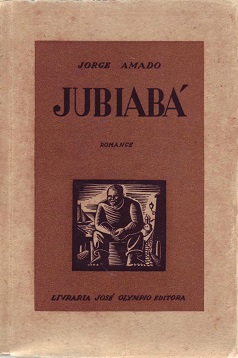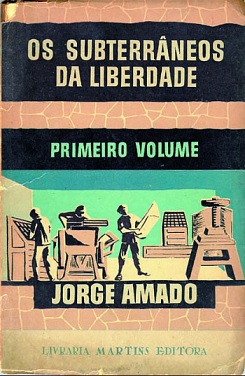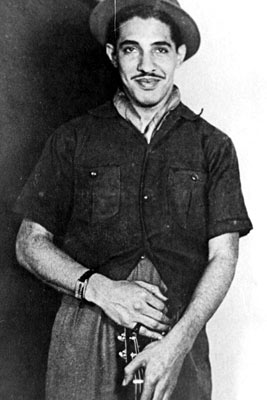Marcel Camus was a French film director. He is best known for Orfeu Negro, which won the Palme d'Or at the 1959 Cannes Film Festival and the 1960 Oscar for Best Foreign Language Film.

Jorge Leal Amado de Faria was a Brazilian writer of the modernist school. He remains the best-known of modern Brazilian writers, with his work having been translated into some 49 languages and popularized in film, including Dona Flor and Her Two Husbands in 1976. His work reflects the image of a Mestiço Brazil and is marked by religious syncretism. He depicted a cheerful and optimistic country that was beset, at the same time, with deep social and economic differences.

Jubiabá is a Brazilian modernist novel written by Jorge Amado in 1935. It earned Amado an international reputation, being hailed by Albert Camus as “a magnificent and haunting” book.

Captains of the Sands is a Brazilian novel written by Jorge Amado in 1937.

The Violent Land is a Brazilian Modernist novel written by Jorge Amado in 1943 and published in English in 1945. It describes the battles to develop cacao plantations in the forests of the Bahia state of Brazil. Amado wrote that "No other of my books.. . is as dear to me as The Violent Land, in it lie my roots; it is from the blood from which I was created; it contains the gunfire that resounded during my early infancy", and suggested that the novel belongs to a distinct Brazilian "literature of cacao". By 1965, the book had been adapted as a film, as well as for the stage, television and radio.

The Bowels of Liberty is a trilogy of Brazilian Modernist novels written by Jorge Amado in 1954. The trilogy comprises Bitter Times, Agony of Night and Light at the End of the Tunnel.

Dona Flor and Her Two Husbands is a novel by Brazilian writer Jorge Amado, published in 1966; it was translated into English by Harriet de Onís in 1969. The novel was adapted for the first time into the 1976 film Dona Flor and Her Two Husbands.

Tent of Miracles is a Brazilian Modernist novel. It was written by Jorge Amado in 1967 and published the following year. It was later adapted to a 1977 Cinema Novo film by director/screenplay writer Nelson Pereira dos Santos.

Tereza Batista: Home from the Wars is a Brazilian modernist novel. It was written by Jorge Amado in 1972 and was published in English in 1975, with a translation by Barbara Shelby.

Showdown is a Brazilian Modernist novel. It was written by Jorge Amado in 1984.

The Discovery of America by the Turks is a Brazilian Modernist novel. It was written by Jorge Amado in 1994 but not published in English until 2012. Amado tells how, in 1991, he was approached by an organization in Italy to write a story to celebrate the fifth centennial of the discovery of the American continent. This would be published in a book, together with stories by Norman Mailer and Carlos Fuentes, which would be handed out to passengers flying between Italy and Central, North and South America in 1992, the year of the fifth centennial. Amado submitted The Discovery of America by the Turks but the Italian book was never published, leaving Amado free to publish the 77-page story as a separate volume.

Brazilian literature is the literature written in the Portuguese language by Brazilians or in Brazil, including works written prior to the country's independence in 1822. Throughout its early years, literature from Brazil followed the literary trends of Portugal, gradually shifting to a different and authentic writing style in the course of the 19th and 20th centuries, in the search for truly Brazilian themes and use of Brazilian forms.

Dorival Caymmi was a Brazilian singer, songwriter, actor, and painter active for more than 70 years, beginning in 1933. He contributed to the birth of Brazil's bossa nova movement, and several of his samba pieces, such as "Samba da Minha Terra", "Doralice" and "Saudade da Bahia", have become staples of música popular brasileira (MPB). Equally notable are his ballads celebrating the fishermen and women of Bahia, including "Promessa de Pescador", "O Que É Que a Baiana Tem?", and "Milagre". Caymmi composed about 100 songs in his lifetime, and many of his works are now considered to be Brazilian classics. Both Brazilian and non-Brazilian musicians have covered his songs.

Zélia Gattai Amado de Faria was a Brazilian photographer, memoirist, novelist and author of children's literature, as well as a member of the Brazilian Academy of Letters. Gattai wrote 14 different literary works, including children's books and her own personal memoirs have been widely published.

Adonias Aguiar Filho was a novelist, essayist, journalist, and literary critic from Bahia, Brazil, and a member of the Academia Brasileira de Letras.

Fernanda Erlanger Rodrigues is a Brazilian actress and television presenter.

Marília Soares Pêra was a Brazilian actress, singer, and stage director. Hailed as "one of the decade's [1980s] ten best actresses" by Pauline Kael, Pêra won the National Society of Film Critics Award for Best Actress in 1982 for her role in Hector Babenco's acclaimed Pixote, and received Best Actress awards at the Gramado Film Festival and at the Cartagena Film Festival for Carlos Diegues' Better Days Ahead. Other films include Bar Esperança, Angels of the Night, and Diegues' Tieta do Agreste.

Bahia de Todos-os-santos: guia de ruas e mistérios de Salvador is a book by the Brazilian writer, Jorge Amado, first published in Portuguese in 1945. It has not yet been published in English.

Gabriela is a 1975 Brazilian telenovela based on the 1958 novel of the same name by Jorge Amado, starring Sônia Braga in the title role.
Cyria Cristina Rocha Coentro is a Brazilian actress and presenter. She was known for participating in the telenovela Renascer (1993). She has performed in O Rei do Gado (1997) and other projects until being recognized for her performance in Viver a Vida (2009) and for starring in Flor do Caribe (2013) and Sete Vidas 2015). In the cinema she made appearances in the films Gonzaga - de Pai pra Filho (2012) and Time and the Wind (2013).


















